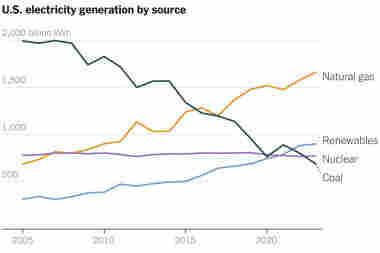U.S. Carbon Emissions Fell in 2023 as Coal Use Tumbled to New Lows ( www.nytimes.com )
I literally just today learned that the "Biden is destroying the climate, we emitted more greenhouse gas than ever before in 2023" talking point isn't even "not the whole story" -- it's actually the complete opposite of what actually happened.
Not only are we still way below the high we set in 2005, the rate is still steadily going down. Maybe the people saying this mean the world as a whole set a record, and they're blaming the entire world's emissions on Biden? I have no idea.
Anyway, this is what actually happened.
Edit: Hang on, I am wrong or partly wrong. The talking-point version is that US set a record for fossil fuel extraction, not emissions, which is completely accurate and also still terrifying. So fair play I guess.
